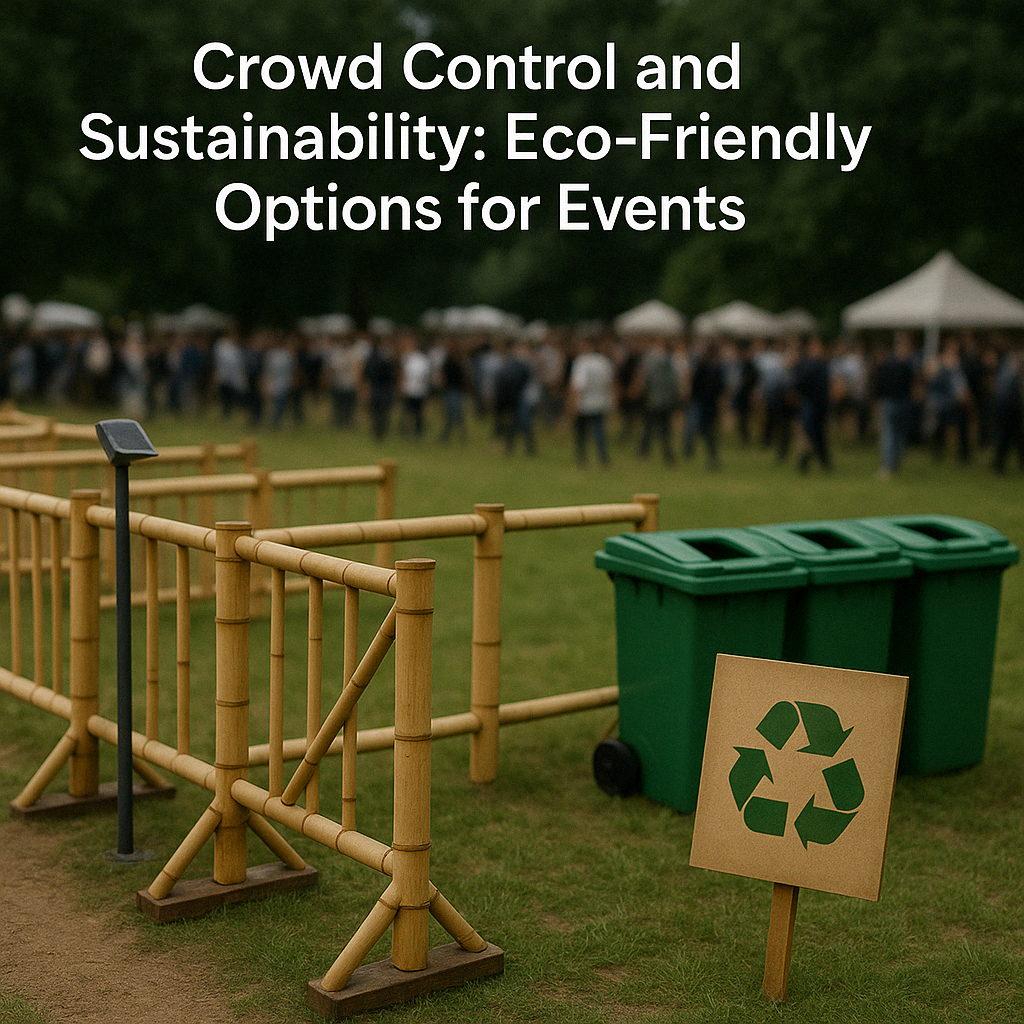Crowd Control and Sustainability: Eco-Friendly Options for Events
Hosting a sustainable event goes beyond just reducing waste—it’s about integrating smart crowd control solutions that support event sustainability while keeping attendees safe. As more organizations embrace green event ideas, finding ways to manage large gatherings with minimal environmental impact has become a priority.
From recyclable barriers to energy-efficient lighting and biodegradable signage, event planners can implement sustainable events management strategies that maintain order without harming the planet. Choosing eco-friendly crowd control options helps reduce waste, lower carbon footprints, and create a smoother, more sustainable event experience for everyone.
In this guide, we’ll explore environmentally friendly crowd management strategies, the benefits of sustainable materials, and how adopting these practices can make green events both efficient and eco-conscious.
Sustainable Crowd Control: Green Options for Safer, Eco-Conscious Events
When planning a sustainable event, crowd control is a crucial factor in ensuring both public safety and environmental responsibility. Traditional crowd barriers and equipment often rely on materials that contribute to waste, but today’s green event ideas focus on eco-friendly alternatives that offer both durability and sustainability.
One of the most effective ways to incorporate event sustainability is by using sustainable materials for crowd control solutions. Instead of plastic or metal stanchions, event planners can opt for bamboo fencing, repurposed wood, or barriers made from recycled materials—all of which provide the necessary structure while reducing environmental impact. Additionally, solar-powered lighting can replace traditional energy-intensive solutions, helping to lower energy consumption while maintaining safety.
Beyond physical barriers, sustainable events management also means reducing single-use plastics and other waste. Digital displays, reusable banners, and compostable wayfinding signs are excellent choices for keeping events organized while minimizing excess materials. Pairing these with eco-friendly practices like waste sorting stations and food composting helps combat food waste while keeping event spaces clean.
By integrating sustainable practices into crowd control, event organizers can create safer, eco-conscious environments that align with modern green event standards. Making these thoughtful choices not only enhances safety but also sets a powerful example of how large gatherings can be both efficient and environmentally responsible.
How Sustainable Practices Enhance Crowd Management and Reduce Environmental Impact
Integrating sustainable practices into crowd management is a crucial step toward creating eco-friendly events that prioritize public safety while minimizing environmental harm. Events, whether large public events or smaller gatherings, generate significant waste, but by adopting biodegradable alternatives, recycling alternatives, and eco-conscious attendees’ expectations, organizers can reduce carbon emissions and promote ecological responsibility without compromising efficiency.
Here are sustainable practices that enhance crowd management and reduce environmental impact:
- Using Recycled and Sustainable Materials for Crowd Control Barriers
Traditional metal or plastic crowd control barriers can be replaced with recycled materials, bamboo fibre, or even concrete barriers made from repurposed materials. These options enhance aesthetic appeal while aligning with sustainable event management goals. On the other hand, if you have existing stanchions, you can learn how to repurpose them by checking out this blog. - Implementing Recycling Stations with Clear Signage
Strategically placed recycling stations and bins with signage indicating proper disposal for recyclable material, organic waste, and plastic waste encourage proper recycling at events. This simple yet effective approach significantly contributes to reduction in waste and a cleaner event space. - Reducing Single-Use Plastics with Reusable Materials
Events can minimize waste by providing reusable water bottles, reusable containers, and recyclable event badges instead of plastic bottles, plastic name badges, or disposable cutlery. Paper badges made from organic cotton or bamboo fibre are also excellent biodegradable alternatives that reduce paper usage. - Cutting Energy Usage with Solar-Powered Solutions
High energy usage at large events can be addressed by installing solar panels for lighting and using digital materials for event branding instead of printed brochures. These environmental benefits not only lower operational costs but also showcase an event’s commitment to sustainability. - Managing Food Waste with Sustainable Alternatives
Organizers can partner with content collaboration platforms and potential sponsors to implement food donation programs, composting for leftover food, and alternatives to single-use food packaging. Encouraging vendors to use reusable materials and eco-friendly packaging further enhances sustainable event management. - Encouraging Sustainable Transportation for a Wider Audience
Reducing carbon emissions involves promoting public transit, cycling, and carpooling among attendees. Providing shuttle services or incentivizing eco-friendly travel options ensures public safety while minimizing traffic congestion at venues.
By integrating these sustainable event strategies, organizers can reduce environmental impact while maintaining a seamless crowd control experience. These practices not only benefit the planet but also appeal to an increasingly eco-conscious audience, making sustainability an essential part of modern public events.
Final Thoughts
Sustainability and crowd management go hand in hand when creating eco-friendly events that prioritize both public safety and environmental safety. By adopting sustainable practices such as recyclable materials, reusable containers, and solar panels, event organizers can significantly reduce carbon emissions, plastic waste, and energy consumption while maintaining efficient crowd control barriers.
Small changes—like replacing plastic name badges with paper badges, using recycling stations with bins with signage indicating proper disposal, and cutting down on single-use plastics—can make a huge difference in reducing waste reduction at public events. Additionally, promoting sustainable transportation and addressing food waste through proper recycling and organic waste programs ensure long-term benefits for both attendees and the environment.
As more event organizers and venues recognize their ecological responsibility, integrating sustainable event management strategies will become the standard rather than an option. By committing to environmental benefits and engaging eco-conscious attendees, businesses and event planners can set a new benchmark for green event ideas while ensuring the satisfaction of people in mass gatherings.


